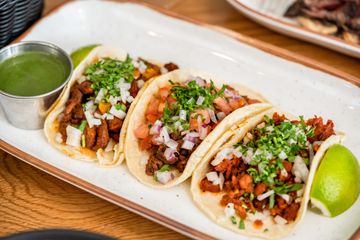Is Mexican Food Healthy And Balanced? Unboxing the Nutritional Benefits of Conventional Components
The inquiry of whether Mexican food is healthy invites an expedition of its typical ingredients. Beans and corn act as foundational staples, abundant in healthy protein and fiber. Avocados give advantageous fats, while different herbs and flavors include taste and wellness advantages - take out and delivery. With each other, these components create a tapestry of nutrition. The healthiness of Mexican cuisine often depends on preparation methods and section dimensions. What duty do these variables play in establishing its total dietary value?
The Power of Beans: Protein and Fiber-Rich Staples
Although frequently neglected, beans work as a cornerstone of Mexican food, supplying a wide range of dietary benefits. Rich in protein, they are an exceptional plant-based alternative for those looking for to satisfy their dietary healthy protein requires. This high protein content sustains muscle mass repair work and development, making beans very useful for both meat-eaters and vegetarians alike. Furthermore, beans are a remarkable resource of dietary fiber, which aids in food digestion and promotes a feeling of volume, possibly assisting with weight management.
The variety of beans made use of in Mexican meals, such as black beans, pinto beans, and kidney beans, contributes to a varied taste profile and can boost dishes nutritionally. Furthermore, beans are low in fat and have crucial minerals and vitamins, including magnesium, folate, and iron. Together, these features make beans a vital ingredient, providing both nourishment and food in typical Mexican fare.

Corn: a Versatile Grain With Nutritional Advantages
Corn stands apart as a flexible grain basic to Mexican food, commemorated not just for its cooking applications yet additionally for its impressive nutritional profile. As a primary ingredient in dishes like tortillas, tamales, and pozole, corn offers vital nutrients that contribute to a balanced diet plan. Rich in carbohydrates, it works as a considerable energy source, while also being reduced in fat, making it a favorable alternative for numerous nutritional demands.
Corn is a great source of dietary fiber, which assists in food digestion and promotes satiety. It contains substantial quantities of vitamins such as B-complex vitamins, which are necessary for basal metabolism. The presence of anti-oxidants, specifically carotenoids, contributes to overall wellness by lowering oxidative anxiety. Furthermore, corn is gluten-free, catering to those with gluten level of sensitivities. On the whole, the dietary benefits of corn emphasize its value in standard Mexican food and its role in a healthy and balanced diet plan.
Avocados: Healthy Fats and Nutrients in Every Bite
Avocados play a substantial function in Mexican food, matching dishes with their luscious structure and abundant flavor. Past their culinary appeal, avocados are commemorated for their outstanding dietary account. They are an abundant source of healthy and balanced monounsaturated fats, which can help reduced poor cholesterol degrees and support heart wellness. Furthermore, avocados are loaded with vital vitamins and minerals, consisting of potassium, vitamin E, and B vitamins, adding to general health.
The high fiber material in avocados help digestion and advertises satiation, making them a useful enhancement to any type of dish. Their unique nutrient structure can also support skin wellness and offer anti-inflammatory advantages. Integrating avocados right into traditional Mexican meals or enjoying them as a standalone snack can boost both flavor and nutrition, showing why they are a beloved staple in Mexican cuisine. On the whole, avocados supply a tasty method to enjoy healthy and balanced fats and crucial nutrients in every bite.
Herbs and spices: Flavorful Health Boosters
While delighting in the rich flavors of Mexican cuisine, one can not overlook the important role that spices and herbs play in enhancing both taste and health. Ingredients such as chili, oregano, and cilantro peppers not just add to the lively flavor profile but additionally offer considerable health and wellness advantages. For example, cilantro is recognized for its purifying buildings, helping to remove hefty metals from the body, while oregano is packed with anti-oxidants and possesses anti-inflammatory effects.
Chili peppers, a staple in lots of Mexican dishes, have capsaicin, which has actually been linked to boosted metabolic process and pain alleviation. Additionally, seasonings like cumin and coriander support food digestion and may aid in blood sugar level policy. Including these delicious health boosters right into meals not just enhances the cooking experience but likewise advertises general health, making Mexican cuisine not simply delicious, yet also nutritionally useful.
Conventional Food Preparation Methods: Enhancing Nourishment and Taste
Conventional food preparation techniques in Mexican cuisine play a necessary role in improving both nourishment and flavor, as they commonly prioritize classic strategies and fresh ingredients. Methods such as nixtamalization, where corn is saturated and cooked in an alkaline option, not just boost the nutrient profile of tortillas however additionally enhance their digestibility - New York Times rated. Furthermore, making use of slow cooking techniques, like cooking or braising, permits tastes to meld magnificently while preserving the stability of the components

Often Asked Inquiries
Are Mexican Food Portions Commonly Larger Than Other Cuisines?
Mexican food portions are typically bigger than those of numerous other foods. This particular shows traditional eating methods, stressing common sharing and hearty dishes, which can result in a much more substantial serving dimension overall.
Exactly how Does the Prep Work Approach Affect Healthiness of Mexican Food?
Preparation approaches greatly influence the healthiness of Mexican food. Strategies such as cooking or steaming preserve nutrients, while frying can boost harmful fat web content. Choices of components and cooking styles inevitably establish overall nutritional value.
Can Mexican Food Be Tailored for Details Dietary Limitations?
Mexican food can without a doubt be customized for specific dietary restrictions. Substitutions, such as utilizing corn tortillas for gluten-free diet plans or integrating even more veggies, make it possible for people to appreciate typical tastes while suiting numerous dietary demands.
What Are Usual Misunderstandings Regarding Mexican Food and Health And Wellness?
Typical mistaken beliefs concerning Mexican food consist of the belief that it is inherently harmful, extremely hot, and entirely focused on fats. In fact, typical meals typically feature nutritious active ingredients and can be tailored to various nutritional requirements.
Are There Much Healthier Options at Mexican Dining Establishments?
Much healthier choices at Mexican restaurants frequently consist of barbequed meats, beans, and fresh vegetables. Choosing dishes that emphasize entire active ingredients and preventing heavy sauces can lead to an extra healthy dining experience, advertising general well-being.
The selection of beans utilized in Mexican dishes, such as black beans, pinto beans, and kidney beans, adds to a varied flavor account and can improve dishes nutritionally. Avocados play a substantial function in Mexican cuisine, enhancing meals with their creamy structure and rich taste. Incorporating avocados right into standard Mexican dishes or appreciating best mexican westchester NY them as a standalone snack can improve both flavor and nourishment, demonstrating why they are a cherished staple in Mexican cuisine. While appreciating the rich tastes of Mexican cuisine, one can not ignore the vital duty that spices and herbs play in boosting both taste and wellness. Conventional food preparation methods in Mexican food play an essential function in boosting both nutrition and taste, as they frequently focus on fresh ingredients and time-honored strategies.